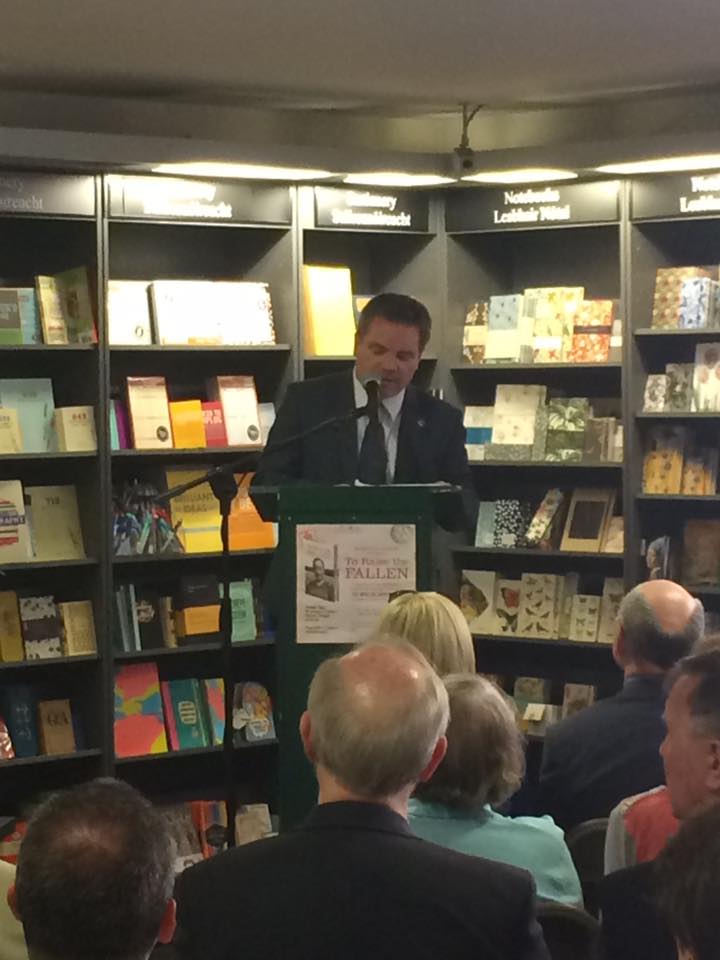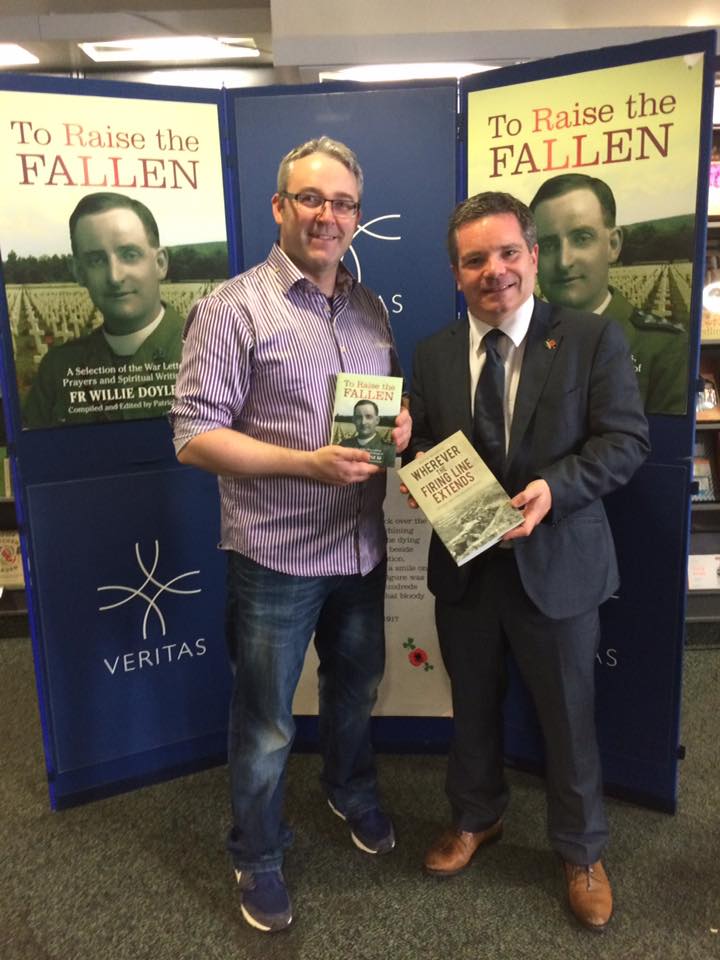Ronan McGreevy launched the book “To Raise the Fallen: A Selection of the War Letters, Prayers and Spiritual Writings of Fr Willie Doyle SJ” in Hodges Figgis bookstore in Dublin. The event was a tremendous success. It was a privilege to have to many at the event as it is a great testament to the devotion – and enthusiasm – that exists for Fr Doyle. It was a special privilege to have some of Fr Doyle’s relatives at the event, as well as the current owner of Melrose, where Fr Doyle was born and grew up. It was also an honour to have many Jesuits in attendance, including the Jesuit Provincial Fr Leonard Moloney SJ. Many thanks to Veritas, the publishers, and Hodges Figgis, a great bookshop, for organising and hosting the event.
I will post some photos of the event in the coming days, but for now some can be found here: https://www.facebook.com/VeritasIreland/posts/1661675287208505
Ronan is a journalist with the Irish Times, and he has a great enthusiasm for helping us Irish to remember the sacrifices many Irish men made in the First World War. The latest paperback edition of his own book Wherever the Firing Line Extends: Ireland and the Western Front contains a new chapter on the Irish at Passchendaele which includes the story of the death of Fr Willie Doyle. It also contains a preface by Mary McAleese, the former president of Ireland. It can be purchased here: https://www.amazon.co.uk/Wherever-Firing-Line-Extends-Ireland/dp/1845888731
It is an excellent book and I am sure that many readers of this blog would find it interesting – go and buy a copy!!
Ronan has an article about Fr Doyle in today’s Irish Times here: https://www.irishtimes.com/opinion/ronan-mcgreevy-an-irishman-s-diary-on-fr-willie-doyle-who-died-in-the-trenches-1.3182685
Below you will find a copy of Ronan’s comments at the launch of the book. I am very grateful to him for his enthusiasm about Fr Doyle and his kind comments about the book.
On August 16th, 2017, we will be commemorating the death of Fr Wille Doyle SJ, but not just Fr Doyle either. On the day he died 1,200 men from the 16th (Irish) Division and the 36th (Ulster) Division were killed during an attack on heavily fortified divisions during the Battle of Langemarck. This was a phase of the Battle of Passchendaele which followed on from the initial attack on July 31st.
The two Irish divisions entered the line on August 4th and for the next 12 days were shelled continually.
In less than two weeks, the two Irish divisions sustained 8,000 casualties to no obvious end. Their treatment, even by the debased standard of the war, was an outrage.
Some years later the war correspondent Phillip Gibbs wrote of the Irish at Langemarck.
“The two Irish divisions were broken to bits and their brigadiers called it murder. They were violent in their denunciation of the Fifth Army for having put their men into the attack after those 13 days of heavy shelling.”
Fr Doyle was killed ministering to three men from the Royal Dublin fusiliers in a shellhole. All their bodies have been lost to the suffocating mud of Flanders and they are remembered on the Tyne Cot Memorial to the missing, but, as we know, death was not the end of the Fr Doyle story.
Altogether 179 British army chaplains were killed in the war; a disproportionate number of them were Catholics. These were all brave men: many of them were distinguished, but why was Fr Doyle remembered above all of these men?
The answer to that question is obvious. The Professor Alfred O’Rahilly book in the early 1920s brought his teachings and life to another generation. It is not hard to see how the story of Fr Doyle, his sufferings and trials, would be so appealing to a generation bereaved by the First World War.
But even that is not to explain his appeal. Though it was his intense spirituality which initially attracted devotees to Fr Doyle, nobody should overlook the attractiveness of his personality or his eloquence.
Few wrote as vividly or as eloquently about the first World War as he did. Take his description of the gas attack at Hulluch during Easter Week 1916 when the Rising was going on in Dublin.
“Many men died before I could reach them and were gone before I could pass back. There they lay, scores of them (we lost 800, nearly all from gas) in the bottom of the trench, in every conceivable posture of human agony; the cloths torn off their bodies in a vain effort to breathe while from end to end of that valley of death came one long unceasing moan from the lips of brave men fighting and struggling for life.”
Or this description of the agonies written by Doyle about the agonies endured by so many Irish mothers.
“My poor brave boys. They are lying now out on the battlefield: some in a little grave dug and blessed by their chaplain, who loves them all as if they were his own children; others stiff and stark with staring eyes, hidden in a shell-hole where they had crept to die; while perhaps in some far-off thatched cabin an anxious mother sits listening for the well-known step and voice which will never gladden her heart again.”
When I was researching my book Wherever the Firing Line Extends: Ireland and the Western Front, a theme popped up again and again, the faith of all the Irishmen involved.
Fr Doyle is a reminder that the majority of Irishmen who fought and died in the First World War were from a Catholic and nationalist background. Today we associate Catholicism with nationalism, but it is a bit more complicated than that. When Roger Casement tried to recruit an Irish brigade in German prisoner-of-war camps he was told by the senior Irish officers “as well as being Irish Catholics, we have the honour of being British soldiers”.
The most famous Irish painting of the First World War is the Last General Absolution of the Munsters at Rue du Bois. It features Fr Francis Gleeson, another stalwart Irish chaplain, blessing the Royal Munster Fusiliers men before the Battle of Aubers Ridge in May 1915.
One sergeant remembered the scene captured so vividly by the artist Fortunio Matania before the men participated in a battle which cost the British Army 11,000 casualties to no end.
“There were no ribald jest, or courage buoyed up with alcohol, none of the fanciful pictures which imagination conjures up of soldiers going to a desperate charge; no, there were brave hearts without fear, only hope that God would bring them through, and if the end – well, only a little shortened of the allotted time span. Every man had his Rosary out reciting the prayers in response to Fr. Gleeson, just as if at the Confraternity at home, instead of having to face death in a thousand hideous forms the following morning.”
As Fr Doyle’s life testifies, these men were not less Catholic or Irish for being British soldiers.While Fr Doyle’s life and devotions I am sure will attract many people of faith, it is his spiritual advice which I find most interesting about this book.
It would be a mistake to detach Fr Doyle’s world view from his faith, but it does not mean that his teachings have no validity in this secular world. Fr Doyle is not just an Irish priest who died in the First World War, he is a man for the ages.
To me the most memorable thing about Pat’s book is how happy Fr Doyle was. This sounds like an impossible paradox given the horrors he witnessed, but there are many counterintuitive things in this book.
His life shows us that often happiness comes from self-denial not self-indulgence and from devoting oneself completely to the service of others.
Fr Doyle was happy because, to paraphrase President Kennedy when he spoke about the American space programme, he did things not because they were easy but because they were hard.
True happiness comes from having a sense of purpose and Fr Doyle in ministering in the most difficult conditions imaginable and bearing the greatest burden.
Fr Doyle says a lot about how soul destroying complaining can become and the importance of cheerfulness. “Keep smiling. It is a grand thing to cultivate a smile. Keep the corners of your mouth up especially if you have an attack of the dumps. “Oh my God, I will never complain. You will get to heaven by keeping this one resolution”.
There are many things in this book which find themselves echoed in the modern practice of mindfulness.
We live in a world of ceaseless distractions. Far too many of us are tethered to our smart phones or the internet. There is a lot in this book about peace of mind.
I’m talking about the self-compassion which he speaks in accepting yourselves and when he speaks of peace at heart. “At all costs you must conquer and keep your peace of mind; otherwise goodbye to holiness”.
There is a world of wisdom in the pages of this book. Take his simple philosophy that one should get up in the morning and do one’s best in every endeavour.
“To do something great and heroic may never come, but I can make my life heroic by faithfully and daily putting my best effort into each duty as it comes round”.
To me his greatest exhortation is his most pithy. “Make every day a generous day”. How much happier and fulfilled we would be if we would could do that.
There is a richness and a wisdom in Fr Doyle’s thoughts which comes from not only his deep spirituality but from his goodness as a person. Fr Doyle was a good man elevated to greatness by the First World War.
Finally, there is one passage in the book that made me smile. In 1914 before the war, Fr Doyle found there was no book on Vocations, so, like all busy men, he decided to do it himself.
Like all authors, he worried that nobody would be interested in buying it and that it would be a waste of time.
“I remember well when the manuscript had passed the censors to my great surprise, the venerable manager of the Messenger Office began shaking his head over the prospect of its selling, for as he said with truth, ‘It is a subject which appeals to a limited few’. He decided to print five thousand, and hinted I might buy them all myself !”
Well that book went on to sell hundreds of thousands of copies. I’m sure Pat and his publisher would settle for a fraction of those sales, but I think this book deserves a wide audience.
Finally I will end with a quotation from Pat in this book which aptly sums up the importance of Fr Doyle in the modern world.
“The priesthood has lost some of the esteem in which it was once held in Ireland. That is precisely why Fr Doyle’s witness is needed now more than ever, and why the time may have come to consider his cause for beatification once again. The Gospel tells us that there is no greater love than to lay down one’s life for others. This is exactly what Fr Doyle did, and not only on 16 August 1917, but in his daily struggle to be generous with God and with others.
Fr Doyle shows us by the generosity of his life, and especially by the sacrifice of his death, how we should behave as Christians.”
To Raise the Fallen can be purchased here: http://www.veritasbooksonline.com/to-raise-the-fallen-a-selection-of-the-war-letters.html




[…] and he delivered a brilliant speech about Fr Doyle at the book launch- you can find it here: https://fatherdoyle.com/2017/08/11/speech-by-ronan-mcgreevy-at-launch-of-to-raise-the-fallen/ has produced an excellent documentary about the Irish involvement in World War I, and in […]